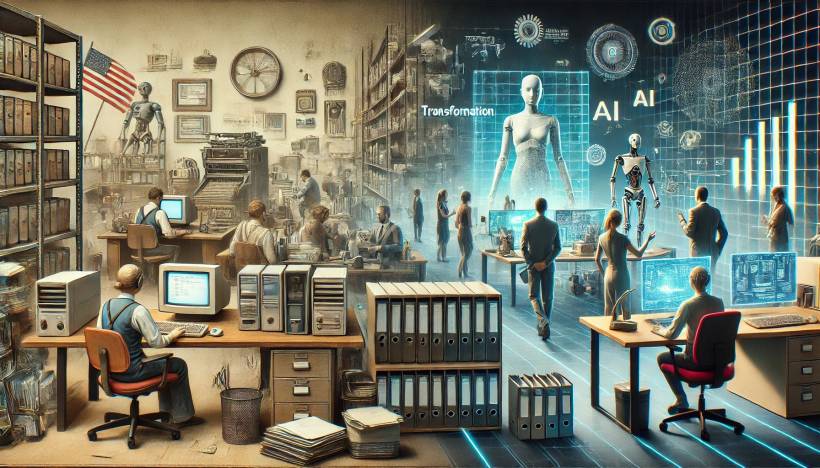Let's not beat around the bush: artificial intelligence is moving fast, and whether we like it or not, it's already changing the way we live and work.
Now, a little confession to kick things off. A while back, someone congratulated me for being in the "AI space." Truth is, those were just my initials, not a tech venture into artificial intelligence. But hey, I still own the name – and I'm keeping it unless someone wants to buy it off me and fund my retirement… or until AI takes over the world. Whichever comes first.
There's no denying AI has become the buzzword of the decade. The release of ChatGPT in late 2022 basically handed superpowers to anyone with a keyboard. Then the competition kicked in, particularly from China, and suddenly powerful AI became accessible to the masses. The ripple effects? Huge. We're just getting started.
A Walk Down Tech Memory Lane
Let me take you back to the early 80s – my first job was with a semiconductor company in Penang. Back then, that industry was the place to be. Think jeans, t-shirts, and calling the bosses from Silicon Valley by their first names. It was a pretty chill, nerdy paradise.
Our big tech back then were machines ironically called "mini" computers – gigantic beasts housed in freezing rooms with raised floors. We were early adopters of IBM's personal computers, typing away on Lotus 123 and WordPerfect before most folks even knew what a floppy disk was.
Then came the "portable" computers – if you could call them that. These things were the size of a small car and cost about as much as one too. Eventually, the people who ran those giant machines became more of a backroom presence, still nerdy, but no longer the stars of the show.
The Disruption Keeps Rolling
I jumped into a telco startup next, one of those rare places that had more PCs than staff. Around that time, I signed up for a brand-new email service called Hotmail. Yes, I still use that address – laugh all you want.
Later, I landed in a bank that was leading the charge on computerisation in Malaysia. We were working with basic terminals and orange screens, but even those rudimentary systems changed everything – making work more "efficient" and centralized.
Then came outsourcing. Entire roles disappeared. Clerks, counter staff, and admin workers were moved into sales roles they weren't prepared for. Layoffs were dressed up as "voluntary," but many didn't have much choice.
One of our biggest branches, which used to be bustling with over 60 staff, eventually operated with just four people. If one person called in sick, the entire branch needed help from neighboring offices. Sure, productivity figures looked great on paper. But stress levels? Through the roof.
The Divide Got Real
Over time, the workforce split into two camps – those in finance, marketing, and tech, who were rewarded handsomely, and… everyone else. For the "others," work life became increasingly harsh. Even for many in the "elite" group, the pressure piled on.
Companies transformed into digital-first operations. Servers moved to the cloud. Even the classic IT nerds who once ruled the roost started getting phased out.
I once told a major company during a digital transformation discussion that they needed to prepare for job losses. There would be human casualties, I warned. And no, training alone wouldn't be enough for many of them. I'm not sure anyone really heard me.
Here Comes AI – Again
Now, in my retirement, I'm watching AI – the real one – reshaping the world. It's still early days, but the disruption is clearly coming. The problem is, society doesn't seem ready for the fallout.
AI is already involved in warfare. It's influencing conflicts, shaping military decisions, and raising a ton of ethical questions. And while efforts are being made to regulate it, it's clear this tech genie isn't going back in the bottle.
This time around, it's not just the usual roles at risk. We're talking about skilled professionals, experienced managers – people who once thought they were untouchable. The AI wave is coming for them too.
Feels a bit like we're living in a scene from The Matrix, doesn't it?
No One's Safe from Change
Even if you're keeping up with tech, or at least trying to, there's still a real risk of becoming obsolete. Especially if you're relying on job security promises from employers who can't possibly deliver on them in the AI era.
What we're seeing is that AI rewards those who can make sense of the data, spot the trends, and make smart decisions – not just those who can write a clever prompt. In short, the benefits are again skewed towards those already holding the upper hand.
The growing gap between the tech elites and the rest of us isn't getting any smaller. And it's all happening during a time when the global pie is shrinking, thanks to war, climate change, and the increasing dominance of powerful, untouchable tech giants.
Brace for Impact
We once believed the internet would democratize knowledge and create a more level playing field. But now, it feels like it's done the opposite – sowing division and amplifying the worst parts of us. And it's mostly controlled by a handful of people who've amassed unimaginable wealth and influence.
Now, they have AI – a tool more powerful than anything we've seen before.
As for me? Being retired and technically already "AI," I've got nothing to worry about. But for everyone else? You might want to keep an eye over your shoulder. The future's coming in fast – and it doesn't care if you're ready.






Comments